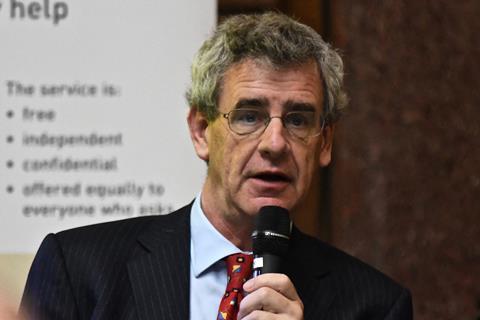In a speech for the Professional Negligence Lawyers Association, Lord Briggs championed voluntary adjudication and gave qualified support to the use of fixed costs and one way costs-shifting to promote access to justice
On 11 November 2024, Bates Wells was pleased to host an event to celebrate the 20th anniversary of the Professional Negligence Lawyers Association's (PNLA) formation. In that time, the PNLA has worked to improve the process for resolving disputes in an area that presents particular challenges for access to justice.


Adverse costs stifle claims
Giving the event’s keynote address, The Right Hon Lord Briggs of Westbourne highlighted how the prospect of an exorbitant costs bill if the claim fails can be a major barrier for access to justice. Lord Briggs cautioned that: 'Many meritorious claims are, potentially, stifled as a result of cost risk.' Other claimants 'may be forced by the cost risk to accept a mediated settlement for much less than their claim is really worth.'
Active costs management by the courts is one way to keep recoverable costs proportionate to the size and complexity of the claim. But the great irony of cost budgeting is the time and effort that is often expended in getting to agreed budgets.
For smaller claims, the government’s answer has been to limit recoverable costs to fixed tariffs. The extension of the fixed recoverable costs regime in October 2023, to cover most claims up to £100,000, has been controversial to say the least. Lord Briggs divided criticisms of the system into two broad themes:
- The regime puts form before substance and fails to tackle the real issue, which is making the court process more efficient and reducing the need to incur large amounts of costs.
- The data that has been used to assess suitable levels for fixed costs is deficient or contains flawed assumptions.
The Supreme Court justice acknowledged that each of these criticisms is serious. Nevertheless, he offered 'room for optimism'. As regards the first point, fixed recoverable costs should not be viewed in isolation, but as one among many 'angles of attack' in securing better access to justice. Lord Briggs’s Civil Courts Structure Review in 2016 highlighted the need for greater use of technology, including the development of an online court, and voluntary adjudication, among other measures to be pursued in addition to fixed costs.
The second area for criticism is a classic example of the devil being in the detail. Attention needs to be given to improving and updating the data and how it feeds through into rules and tables. These must not become so complicated so as to be unmanageable. But that should not be a reason to abandon the regime altogether.

Extend QOCS
One area that Lord Briggs identified as ripe for refinement is the use of qualified one-way costs shifting (QOCS), which protects an unsuccessful claimant in personal injury cases from having to pay adverse costs in most circumstances. The rationale behind this is the asymmetry between individual litigants and well-resourced, insured defendants.
Back in his 2016 report, Lord Briggs noted that a similar asymmetry existed in professional negligence claims outside the clinical sphere. The lack of QOCS meant that access to justice was lagging behind for those claims. In his speech to the PNLA, which has raised similar concerns, Lord Briggs renewed that call for QOCS to be extended to non-medical professional negligence claims.
Comment
Aside from costs, Lord Briggs’s speech highlighted several areas where progress has been made to improve access to justice. A greater use of technology by the courts, the voluntary adjudication scheme for professional negligence and the ability for courts to compel ADR have all been positive developments. Lord Briggs also reminded the profession the vital but often overlooked contribution played by pro bono work.
When it comes to litigation costs, options and opinions become more complex and divisive. Fixed recoverable costs have a role to play in certain cases, but it is far from clear that the current regime strikes the right balance. Similarly, extending QOCS may benefit claimants, but concerns have been raised in the past about the potential to create an industry of claims farming or push up insurance premiums.
These risks would need to be considered carefully, to ensure that any reforms did not inadvertently end up reducing access to justice. Nevertheless, in an area where there are no easy answers, thoughtful contributions to the public debate such as this from Lord Briggs are vitally important.
Ashley Morgan, proposals and client intelligence manager, and Tim Constable, partner, Bates Wells































No comments yet